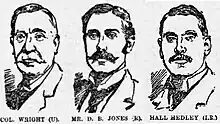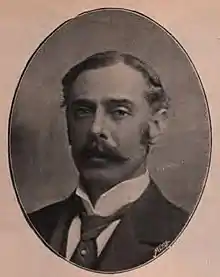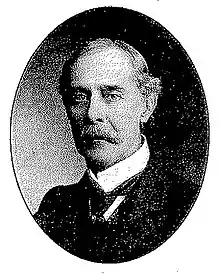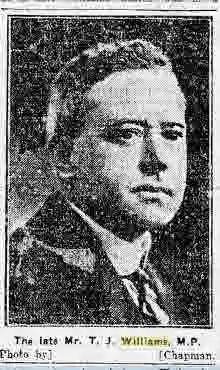| Swansea District | |
|---|---|
| Former Borough constituency for the House of Commons | |
| 1832–1918 | |
| Seats | one |
| Created from | Cardiff[1] |
| Replaced by | Aberavon and Neath |
Swansea District before 1885 also known as Swansea District of Boroughs was a borough constituency. It was represented in the House of Commons of the Parliament of the United Kingdom. It elected one Member of Parliament (MP) by the first past the post system of election.
Overview
The seat was created for the 1832 general election, and abolished for the 1918 general election. Swansea District was a strongly Liberal constituency, dominated by the tinplate and steel industries, together with coal.
Boundaries
Upon its creation in 1832 it comprised five small boroughs: Swansea, Neath, Aberavon, Kenfig and Loughor. A small increase in their limits occurred in 1868.
In 1885, the seat was split into two, with the central part of Swansea borough forming the Swansea Town constituency, and the northern part of Swansea borough centred on Morriston, together with the four smaller boroughs, forming the seat Swansea District.
The first member after 1885 was Henry Vivian, who had represented Glamorgan county 1857–1885.
Members of Parliament
- Constituency created (1832)
| Year | Member | Whip | |
|---|---|---|---|
| 1832 | John Henry Vivian | Whig[2][3][4][5] | |
| 1855 | Lewis Llewelyn Dillwyn | Whig[6][7][8] | |
| 1859 | Liberal | ||
| 1885 | Sir Henry Vivian | Liberal | |
| 1886 | Liberal Unionist | ||
| 1887 | Liberal | ||
| 1893 | William Williams | Liberal | |
| 1895 | Sir David Brynmor Jones | Liberal | |
| 1915 | Thomas Jeremiah Williams | Liberal | |
| 1918 | constituency abolished | ||
Electoral history
Elections in the 1830s
| Party | Candidate | Votes | % | ±% | |
|---|---|---|---|---|---|
| Whig | John Henry Vivian | Unopposed | |||
| Registered electors | 1,307 | ||||
| Whig win (new seat) | |||||
| Party | Candidate | Votes | % | ±% | |
|---|---|---|---|---|---|
| Whig | John Henry Vivian | Unopposed | |||
| Registered electors | 1,303 | ||||
| Whig hold | |||||
| Party | Candidate | Votes | % | ±% | |
|---|---|---|---|---|---|
| Whig | John Henry Vivian | Unopposed | |||
| Registered electors | 1,349 | ||||
| Whig hold | |||||
Elections in the 1840s
| Party | Candidate | Votes | % | ±% | |
|---|---|---|---|---|---|
| Whig | John Henry Vivian | Unopposed | |||
| Registered electors | 1,287 | ||||
| Whig hold | |||||
| Party | Candidate | Votes | % | ±% | |
|---|---|---|---|---|---|
| Whig | John Henry Vivian | Unopposed | |||
| Registered electors | 1,563 | ||||
| Whig hold | |||||
Elections in the 1850s
| Party | Candidate | Votes | % | ±% | |
|---|---|---|---|---|---|
| Whig | John Henry Vivian | Unopposed | |||
| Registered electors | 1,694 | ||||
| Whig hold | |||||
Vivian's death caused a by-election.
| Party | Candidate | Votes | % | ±% | |
|---|---|---|---|---|---|
| Whig | Lewis Llewelyn Dillwyn | Unopposed | |||
| Whig hold | |||||
| Party | Candidate | Votes | % | ±% | |
|---|---|---|---|---|---|
| Whig | Lewis Llewelyn Dillwyn | Unopposed | |||
| Registered electors | 1,901 | ||||
| Whig hold | |||||
| Party | Candidate | Votes | % | ±% | |
|---|---|---|---|---|---|
| Liberal | Lewis Llewelyn Dillwyn | Unopposed | |||
| Registered electors | 1,921 | ||||
| Liberal hold | |||||
Elections in the 1860s
| Party | Candidate | Votes | % | ±% | |
|---|---|---|---|---|---|
| Liberal | Lewis Llewelyn Dillwyn | Unopposed | |||
| Registered electors | 1,967 | ||||
| Liberal hold | |||||
| Party | Candidate | Votes | % | ±% | |
|---|---|---|---|---|---|
| Liberal | Lewis Llewelyn Dillwyn | Unopposed | |||
| Registered electors | 7,543 | ||||
| Liberal hold | |||||
Elections in the 1870s
| Party | Candidate | Votes | % | ±% | |
|---|---|---|---|---|---|
| Liberal | Lewis Llewelyn Dillwyn | 5,215 | 65.8 | N/A | |
| Conservative | Charles Bath[10] | 2,708 | 34.2 | New | |
| Majority | 2,507 | 31.6 | N/A | ||
| Turnout | 7,923 | 63.5 | N/A | ||
| Registered electors | 12,476 | ||||
| Liberal hold | |||||
Elections in the 1880s
| Party | Candidate | Votes | % | ±% | |
|---|---|---|---|---|---|
| Liberal | Lewis Llewelyn Dillwyn | Unopposed | |||
| Registered electors | 13,631 | ||||
| Liberal hold | |||||
| Party | Candidate | Votes | % | ±% | |
|---|---|---|---|---|---|
| Liberal | Henry Vivian | Unopposed | |||
| Liberal hold | |||||
In 1886, Vivian briefly joined the Liberal Unionists but was nevertheless returned unopposed and returned to the Gladstonian fold soon after the election.
| Party | Candidate | Votes | % | ±% | |
|---|---|---|---|---|---|
| Liberal Unionist | Henry Vivian | Unopposed | |||
| Liberal Unionist gain from Liberal | |||||
Elections in the 1890s
| Party | Candidate | Votes | % | ±% | |
|---|---|---|---|---|---|
| Liberal | Henry Vivian | 5,959 | 86.5 | New | |
| Conservative | Herbert Monger[13] | 933 | 13.5 | New | |
| Majority | 5,026 | 73.0 | N/A | ||
| Turnout | 6,892 | 68.6 | N/A | ||
| Registered electors | 10,047 | ||||
| Liberal hold | Swing | N/A | |||
In 1893, when he was elevated to the peerage becoming Lord Swansea, he was succeeded by the Morriston tinplate owner, William Williams.
| Party | Candidate | Votes | % | ±% | |
|---|---|---|---|---|---|
| Liberal | William Williams | Unopposed | |||
| Liberal hold | |||||
Williams served for only two years before being replaced in 1895 by Brynmor Jones. Jones had strong nonconformist connections but his political career was undistinguished and he concentrated on his legal career.[14]

| Party | Candidate | Votes | % | ±% | |
|---|---|---|---|---|---|
| Liberal | Brynmor Jones | 3,850 | 49.9 | −36.6 | |
| Independent Liberal-Labour | Ernest Hall Hedley | 2,018 | 26.1 | New | |
| Conservative | John Wright | 1,851 | 24.0 | +10.5 | |
| Majority | 1,832 | 23.8 | −49.2 | ||
| Turnout | 7,719 | 75.4 | +6.8 | ||
| Registered electors | 10,237 | ||||
| Liberal hold | Swing | −23.6 | |||
Elections in the 1900s

| Party | Candidate | Votes | % | ±% | |
|---|---|---|---|---|---|
| Liberal | Brynmor Jones | Unopposed | |||
| Liberal hold | |||||

| Party | Candidate | Votes | % | ±% | |
|---|---|---|---|---|---|
| Liberal | Brynmor Jones | Unopposed | |||
| Liberal hold | |||||
Elections in the 1910s
| Party | Candidate | Votes | % | ±% | |
|---|---|---|---|---|---|
| Liberal | Brynmor Jones | 8,488 | 77.9 | N/A | |
| Conservative | Robert Campbell | 2,415 | 22.1 | New | |
| Majority | 6,073 | 55.8 | N/A | ||
| Turnout | 10,903 | 84.0 | N/A | ||
| Registered electors | 12,983 | ||||
| Liberal hold | Swing | N/A | |||
| Party | Candidate | Votes | % | ±% | |
|---|---|---|---|---|---|
| Liberal | Brynmor Jones | Unopposed | |||
| Liberal hold | |||||
| Party | Candidate | Votes | % | ±% | |
|---|---|---|---|---|---|
| Liberal | Brynmor Jones | Unopposed | |||
| Liberal hold | |||||
| Party | Candidate | Votes | % | ±% | |
|---|---|---|---|---|---|
| Liberal | Brynmor Jones | Unopposed | |||
| Liberal hold | |||||

| Party | Candidate | Votes | % | ±% | |
|---|---|---|---|---|---|
| Liberal | Thomas Williams | Unopposed | |||
| Liberal hold | |||||
References
- ↑ Escott, Margaret. "Cardiff Boroughs". The History of Parliament. Retrieved 5 May 2020.
- ↑ Stooks Smith, Henry (1845). The Parliaments of England, from 1st George I., to the Present Time. Vol II: Oxfordshire to Wales Inclusive. London: Simpkin, Marshall, & Co. p. 65. Retrieved 22 August 2018 – via Google Books.
- ↑ Dod, Charles Roger; Dod, Robert Phipps (1847). Dod's Parliamentary Companion, Volume 15. Dod's Parliamentary Companion. p. 250. Retrieved 22 August 2018 – via Google Books.
- ↑ Churton, Edward (1836). The Assembled Commons or Parliamentary Biographer: 1836. p. 229. Retrieved 22 August 2018 – via Google Books.
- ↑ "SWANSEA". Drogheda Conservative Journal. 10 July 1841. p. 1. Retrieved 22 August 2018 – via British Newspaper Archive.
- ↑ "Wiltshire Independent". 8 March 1855. p. 3. Retrieved 22 August 2018 – via British Newspaper Archive.
- ↑ "Shrewsbury Chronicle". 2 March 1855. pp. 5–6. Retrieved 22 August 2018 – via British Newspaper Archive.
- ↑ "John Bull". 3 March 1855. pp. 12–13. Retrieved 22 August 2018 – via British Newspaper Archive.
- 1 2 3 4 5 6 7 8 9 10 11 12 13 Craig, F. W. S., ed. (1977). British Parliamentary Election Results 1832-1885 (e-book) (1st ed.). London: Macmillan Press. p. 514. ISBN 978-1-349-02349-3.
- ↑ "Swansea". London Evening Standard. 2 February 1874. p. 6. Retrieved 21 January 2018 – via British Newspaper Archive.
- 1 2 3 4 5 6 7 8 9 10 11 12 Craig, F. W. S., ed. (1974). British Parliamentary Election Results: 1885-1918. London: Macmillan Press. p. 462. ISBN 9781349022984.
- 1 2 The Liberal Year Book, 1907
- ↑ "Herbert Monger". Griffiths Family Group Sheets. Archived from the original on 30 August 2013. Retrieved 28 July 2023.
{{cite web}}: CS1 maint: unfit URL (link) - ↑ Morgan, Kenneth O. (1960). "Democratic Politics in Glamorgan, 1884-1914". Morgannwg. 4: 5–27. see page 12.
- ↑ Debrett's House of Commons & Judicial Bench, 1901
Further reading
- Thomas, Daniel Lleufer (1911). . In Chisholm, Hugh (ed.). Encyclopædia Britannica. Vol. 26 (11th ed.). Cambridge University Press. p. 181.
- Morgan, Kenneth O (1991). Wales in British Politics 1868–1922 (3rd ed.). Cardiff: University of Wales Press. ISBN 978-0708311240.
- Leigh Rayment's Historical List of MPs – Constituencies beginning with "S" (part 6)